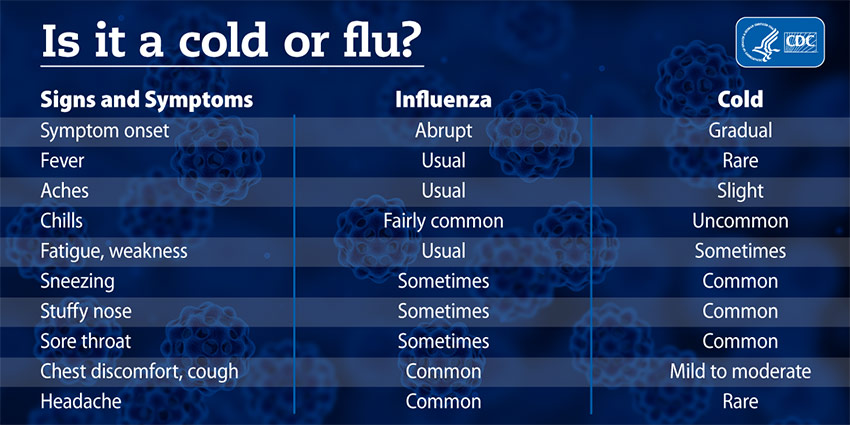As the weather gets colder, the odds of picking up a respiratory illness like a cold or the flu increase. While both can make you miserable, it’s important to understand the difference, especially if your symptoms worsen.
Cold Symptoms
A cold is a viral infection that typically affects the nasal part of the respiratory system. The infection is usually mild and goes away without treatment. Symptoms may include a runny nose, headache, and sneezing. About half of patients can also experience a cough or sore throat.
A cough that persists after other cold symptoms have cleared up may indicate bronchitis, also called a chest cold, which is an inflammation of the airways in the lungs. Colds are most common in winter and spring months, and usually last about a week.
Flu Symptoms
The flu is caused by the influenza virus and usually results in symptoms that come on quickly and are more severe than cold symptoms. Symptoms of flu include sore throat, fever, headache, muscle aches and soreness, congestion, and cough. Most flu symptoms gradually improve over two to five days, but it's not uncommon to feel run down for a week or more.
Anyone can get the flu, even healthy people, and serious problems related to the flu can happen at any age, but some people are at high risk of developing serious flu-related complications if they get sick.
Those considered at high risk for complications from the flu include:
- Individuals over the age of 65
- People of any age with chronic medical conditions, such as asthma, diabetes, or lung or heart disease
- Pregnant women
- Young children
Do I have a cold or the flu?
Use this chart to help determine if you have a cold or the flu:

When You Should See a Doctor
Colds and the flu are not treated with antibiotics and rarely require a trip to the doctor. While the flu can occasionally be life-threatening for those at high risk of complications, for most people the best remedy for a speedy recovery from a cold or flu is usually rest and plenty of fluids. Colds and the flu are highly contagious, so you should stay home and avoid contact with other people.
You should seek medical attention if you experience any of the emergency warning signs of flu sickness, especially if you are at a higher risk of complications. If you have any of these symptoms, visit a MedStar Health Urgent Care location for urgent care as soon as possible.
What are the emergency warning signs of flu sickness?
In adults:
- Difficulty breathing or shortness of breath
- Pain or pressure in the chest or abdomen
- Sudden dizziness
- Confusion
- Severe or persistent vomiting
- Flu-like symptoms that improve but then return with fever and worse cough
In young children:
- Fast breathing or trouble breathing
- Bluish skin color
- Not drinking enough fluids
- Not waking up or not interacting
- Being so irritable that the child does not want to be held
- Flu-like symptoms that improve but then return with fever and worse cough
- Fever with a rash
Want to learn more about MedStar Health Urgent Care and its services?
Click below to learn more and find a location near you.
Learn More